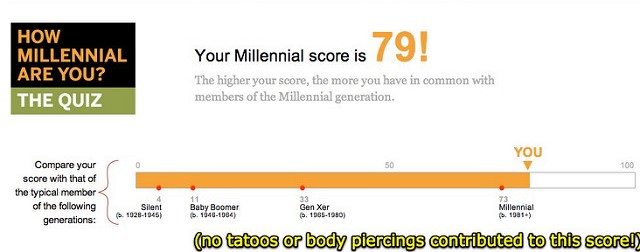
Originally published Sept. 16, 2016
Millennial bashing is back in the spotlight, from #howtoconfuseamillennial to Survivor’s latest season. Satirizing the youths is all in good fun, but when the media casts them as “the most high maintenance workforce in the history of the world,” the shtick can get a little old. So what do we actually know about Millennials?
Social scientists look for “cohort trends”— changes that occur not because individual people are changing their attitudes or behaviors, but because a new generation is coming of age. Pew Research data shows the Millennial cohort, born between 1977 and 1992, are less likely to be married than members of other cohorts at the same age, more likely to be non-religious, and more likely to be living at home despite an improving economy. This seems like a contradiction, but social science helps us understand why Millennials seem to be fiercely independent, but also missing key markers of adulthood. The research shows they aren’t just shallow or selfish—they are responding directly to unique social pressures.
Surveys find the Millennial cohort focuses more on extrinsic goals like achievement and money, and it scores slightly lower on measures of empathy and community concern. We have to put these findings in context, however, because in-depth interviews show many of these beliefs stem from challenges like declining job security, economic inequality, and unreliable social institutions.
- Jean M. Twenge, W. K. Campbell and Elise C. Freeman. 2012. “Generational Differences in Young Adults’ Life Goals, Concern for Others, and Civic Orientation, 1966-2009.” Journal of Personality and Social Psychology 102(5): 1045-1062
- Jennifer M. Silva. 2014. “Slight Expectations: Making Sense of the ‘Me Me Me’ Generation.” Sociology Compass 8(12): 1388-1397
These extrinsic and individualistic motives mean Millennials are more likely to question existing institutions, and this has benefits. While they are less likely to be religious and more likely to defer marriage and childbearing, for example, this cohort also caps off a trend toward a society more accepting of difference, and they actually report higher job satisfaction.
- Andrew Cherlin, Erin Cumberworth, S. Philip Morgan, and Christopher Wimer. 2013. “The Effects of the Great Recession on Family Structure and Fertility.” The ANNALS of the American Academy of Political and Social Science 650(1):214–31.
- Brenda J. Kowske, Rena Rasch, and Jack Wiley. 2010. “Millennials’ (Lack Of) Attitude Problem: An Empirical Examination of Generational Effects on Work Attitudes.” Journal of Business and Psychology 25(2):265–79.
- Jean M. Twenge, Nathan T. Carter, and W. Keith Campbell. 2015. “Time Period, Generational, and Age Differences in Tolerance for Controversial Beliefs and Lifestyles in the United States, 1972–2012.” Social Forces 94(1):379–99.

Comments